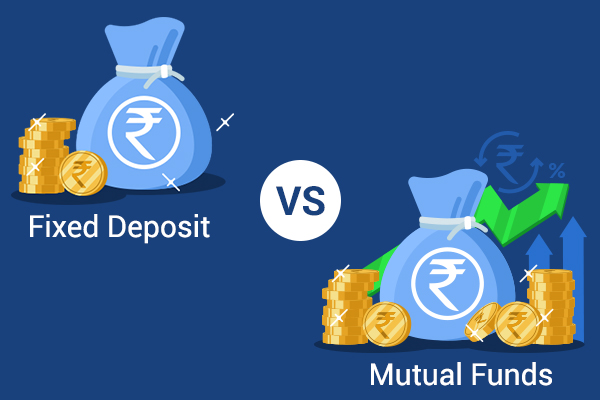Fixed Deposit vs Mutual Funds: Which is Best to Invest?

Fixed Deposits (FDs) pay interest on the amount deposited, while Mutual Funds (MFs) pay returns on investments. In order to achieve your financial goals, you can choose between Mutual Funds, Systematic Investment Plans, and Fixed Deposits.
There are multiple investment options for an investor in the financial market. Each type of investor can find something in the market, like long-term safe investments for risk-averse investors or market-based investment options for investors who like taking risks for higher returns.
These financial instruments help an investor grow their money and make earnings on their savings. The most popular financial instruments among the various investment options are Mutual Funds (MF) and Fixed Deposits (FD). Mutual Funds and Fixed Deposits are relatively safer than other investment options that are directly market-dependent. An FD interest calculator can tell you the returns you will earn on your investment.
However, one may be more suitable than the other for an investor based on their risk appetite and financial goals. Here is a detailed guide to the two investment types to help you decide between them.
What is a Fixed Deposit?
A Fixed Deposit is a term deposit that locks your invested money for a fixed duration and gives pre-decided returns. The investor’s corpus remains safe in this investment and gives steady returns. The amount invested by the investor in an FD is not affected by movements in the stock market or the country’s economic conditions. An investor can open an FD online or offline with a bank of their choice. Fixed Deposits can be cumulative or non-cumulative, depending on the kind of payout chosen. A non-cumulative FD can give you periodic interest payouts, and a cumulative FD can give you a better rate of interest for FD by giving you the benefit of interest on interest.
Benefits of a Fixed Deposit
- Fixed Deposits are governed by the Reserve Bank of India (RBI), which makes them a low-risk option. The risk of scams and frauds is negligible due to the central bank’s monitoring of FDs, and the RBI highly rates these.
- An investor can open an FD account easily with the online option and get guaranteed returns on their invested money. A calculator for FD interest calculation is also available on the websites of top banks offering FDs.
- Fixed Deposits offer tax benefits to the investor under the Income Tax Act, 1961 and do not make the investor bear the extra investment cost.
- For a higher rate of interest for FD, an investor can invest in a cumulative FD or a senior citizen FD.
What is a Mutual Fund?
Mutual Funds are moderate-risk investment tools that offer high returns and are a preferred investment option for many. Mutual Fund is a type of investment where money is pooled from individual investors and invested in different companies. The returns earned on such an investment get distributed among the investors and become their earnings on investment.
Benefits of a Mutual Fund
- Mutual funds are long-term schemes that help you save and grow your money in the longer run.
- An investor can start investing in a Mutual Fund with an amount as low as Rs. 500.
- You can invest directly in an MF without the help of a broker and save on brokerage charges.
- Mutual Fund gains made before the end of the year are taxed under short-term capital gains.
- Mutual Funds have a lock-in period, but an investor can exit them at any time.
Differences Between Mutual Funds and Fixed Deposits
Feature |
Mutual Funds |
Fixed Deposits |
Rate of Return |
Higher than FDs |
Lower than MFs |
Dividend Option |
Available |
Not available |
Risk |
Higher than FD |
Lower than MFs |
Liquidity |
High |
Low |
Investment Option |
SIP or one-time investment |
One-time investment |
Early Withdrawal |
Allowed with or without a penalty depending on the MF scheme |
Allowed with a penalty |
Investment Expense |
Expense ratio charged |
No such charge |
The Final Word
Interest-based returns are provided by Fixed Deposits (FDs), while investment returns are provided by Mutual Funds (MFs).
Mutual Funds may bring higher returns for the investor, but they come with a higher risk too. MFs are suitable for investors who want to explore different investment schemes and are ready to take a higher risk on their money. The rate of interest for FD is fixed and governed by the central bank, making them extremely safe for the investor. You can use a calculator for FD interest and calculate your earnings when opening an FD account.

 Blog
Blog Blog
Blog



Comments
No comments yet.